先住民とは誰か?
Who are
Indigenous people?
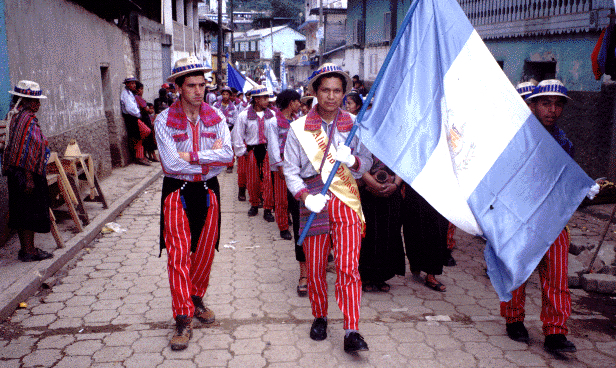

国旗を掲げて独立記念日に行進するグアテマラのマム=マヤ系先住民/ブリスベンで抗議するオーストラリアのアボリジニ
先住民とは誰か?
Who are
Indigenous people?


国旗を掲げて独立記念日に行進するグアテマラのマム=マヤ系先住民/ブリスベンで抗議するオーストラリアのアボリジニ
池田光穂
「先住民は歴史の盲点から姿を現した。もはや悲壮な犠牲者でも、失われた世界の高貴なメッセ
ンジャーでもなく、彼らはローカルな、ナショナルな、グローバルな舞台における、目
に見える行為者である」(ジェームズ・クリフォード
2020:15)。
先住民(複数あるいは集合名詞)とは誰のことでしょ うか?(→「先住民性」「先住民とは誰か 2.0」)
世界中には、先住民と呼ばれる人たちがたくさんいま す。先住民の数は正確に統計をとられているわけではありませんが、1968年に創設されたコペンハーゲン(デンマーク)に本部をおくNPOの「先住民問題 のための国際作業グループ(the International Work Group for Indigenous Affairs, IWGIA)」によると、全世界に3億7千万人の人がいると言われています。
先住民(idigenous people)という名称の他に、「インディアン」「インディヘナ」「インディオ」「トライブ」「トライバル・ピープル」「アボリジナル(アボリジ ニー)」や「現地人(ネイティブ)」など、先住民を表現する語彙が数多くあります。これらの語彙は、時に非先住民の人たちからの差別語(蔑称)であったり するという否定的な意味をもつこともあります が、当事者やまた支援者たちから誇り高い名称だと言われることもあります。言葉ですので、どの言葉を使えば差別なりうるのか、またそうではないのかは、そ れらの用語がどのような脈絡=文脈のなかで誰が、誰に対して使われるのかによって、決まります。また、差別がおこった後に、その言葉の使われ方が検証され る場合にも、真意はそうではないと弁解されることもありますので、明らかな差別語や、その言葉が吐かれる時に他には考えれないような——十中八九そう思わ れる——使い方には留意する必要があります。
さて、以下の叙述は、IWGIAによるウェブページ (文献にURLを記載)からの情報も交えて説明しています。
では、先住民はどのように定義されるのでしょうか? すなわち先住民はどのような人びとのことをさすのでしょうか?
「先住民の定義としてよく引用されるのは、国連小委員会の特別報告官であるホセ・マルティネ
ス・コボ
による定義です。コボの1986年の報告書は、国連経済社会理事会、人権委員会、少数民族の差別防止・保護小委員会の第35回会合の暫定議題第12項
「先住民に対する差別問題の研究」のために作成されました。コボ氏は、先住民、コミュニティ、国民を、彼らが発展させた領土内において「植民地化以前の社
会と
の歴史的連続性」を持つ集団と定義し、また、彼らの領土内にある現在の「社会の他のセクターとは異なる」コミュニティと表現しています。さらにコボ氏は、
先住民
および先住民コミュニティは、民族としてのアイデンティティと先祖代々の領土を将来の世代のために守ろうと努力している現代の人口におけるマイノリティで
あると強調しています」→先住民性[Indigeneity])
結論から言うと、世界統一した定義も(上記のような 差別語のニュアンスのない)客観的で明確な定義もないという現状があります。1997年7月に「先住民の権利に関する国連宣言(The United Nations Declaration on the Rights of Indigenous Peoples, July, 1997)」が採択された時にも、先住民の定義がなされなかったこともあります。なぜなら、すべて文脈に単一の定義をおこ なうことは、ある集団を先住民と認める時には厳しすぎ(under-inclusive)たり、逆に先住民と認めるには緩すぎる(over- inclusive)ことになってしまうからです。にも関わらず、それを定義しようとする努力がなされてきたことも事実です。
国連の機関である国際労働機関 (International Labour Organization, ILO)条約169号(1989)——しばしば言及されますので覚えておきましょう!——では、先住民(tribal peoples)と認定される理由 を次のような根拠に求めています。最下段にある【資料編】参照してください。
彼ら(=先住民, tribal peoples) は、植民地化される以前からその 地域に住んでいた人のたちの末裔であるがゆえに……あるいは、
彼ら(=先住民, tribal peoples) は、植民地化と新しい国家が確立 されてから以降からもずっと、独自の社会的・経済的・文化的・政治的諸制度を維持しつづけているがゆえに……
【すでに簡単に触れておきましたが】国連の「少数者への差別を防止する国連の小委員会 (the UN Sub-Commission on the Prevention of Discrimination of Minorities)」の(その委員長であった)マルティネス・コボ[委員会]報告(Martinez Cobo's Report, 1986)では、先住民のコミュニティ・先住の民・先住のネーションを次のように叙述しています。
"Indigenous communities, peoples and nations are those which, having a historical continuity with pre-invasion and pre-colonial societies that developed on their territories, consider themselves distinct from other sectors of the societies now prevailing in those territories, or parts of them."
「先住のコミュニティーズ、すなわち自分たちの領域(テリト リー)において生じた侵略される以前から/植民される以前からの社会を発展させてきた歴史的連続性をもっているとされる〈人びとやネーション〉は、それらのテリトリーあるいはその一部において、現在では優勢な社会の他 の部分(=他のコミュニティ)と、自分たちのことを区分して独自なものであると考えている」
"They form at present non-dominant sectors of society and are determined to preserve, develop and transmit to future generations their ancestral territories, and their ethnic identity, as the basis of their continued existence as peoples, in accordance with their own cultural patterns, social institutions and legal systems."
「先住のコミュニティーズ(=They)は、現在では社会のなかの支配的とは言えない部分を構成していて、彼らの先祖の領域(テリトリー)と自分たちの民族的アイデンティティ(= ethnic identity)を未来の世代に対して、守り・発展・継承していく決心をしている。すなわち(彼らのテリトリーとアイデン ティティをもつ)民として、自らの文化的パターンズ・社会的制度・(そして)法体系に従って、存在し続ける基礎となるからである。
以上のことから先住民と呼ばれる/あるいは自ら先住
民と自称する人たちには、以下のような特徴がみられます——ただし、これらの要素の一部ないし殆どが欠落していても「先住民」として認定されないというわ
けではありません。その理由は、1)先住民は自分の出自社会と文化(言語)にアイデンティティをもつ集団であり、2)先住民としての自覚をもつ、ないしは
「復権する」権利をもつと自覚している集団——すなわち社会的差別によってかつて先住民であることを自称することを抑圧され、その名称やアイデンティティ
形成が(他者からみて)形骸化しているように見えても、それを当事者自身が復権するアイデンティティや「何らかの根拠」があればその要件をもつ集団であ
り、3)先住という「歴史的事実」により、侵略や植民以前の状態の法的権原を回復できる資格を「帰属する国家」に請求する権利をもった集団であれば、よい
からです。
以上の根拠から、先住民には少なくとも、以下の4つ の権利と権原があると言うことができます。(1)集合的権利(Collective rights)、(2)自己決定権(Self-determination)、(3)自己認識/自己アイデンティティ権(Self- identification)、そして(4)土地権と天然資源に関する固有の権利(Land rights and natural resources)。
(1)集合的権利(Collective rights)
(2)自己決定権(Self- determination)
(3)自己認識/自己アイデンティティ権(Self - identification)
(4)土地権と天然資源に関する固有の権利 (Land rights and natural resources)
++
脚注

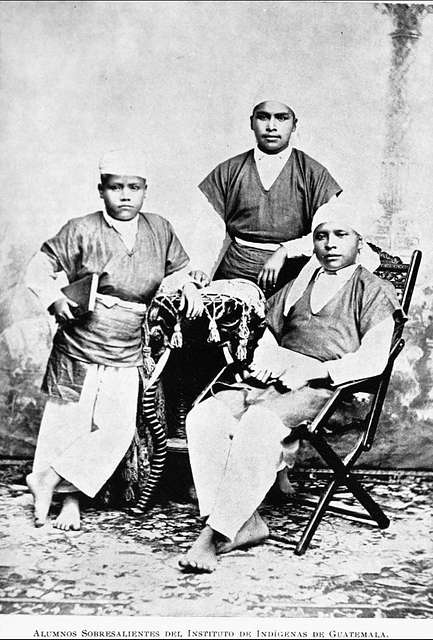
Antigua, Guatemala, 1916/ Alumnos distinguidos del Instituto Agricola de Indígenas. Guatemala, 1897.
★International Work Group for Indigenous Affairs (IWGIA), from Wikipedia - 国際先住民問題作業部会
| The International Work Group for Indigenous Affairs (IWGIA)
is an independent and non-profit international human rights-based
membership organization, whose central charter is to endorse and
promote the collective rights of the world's indigenous peoples.[3]
Established in 1968, the IWGIA is registered as a non-profit
organization in Denmark, with the head office of its secretariat based
in Copenhagen. IWGIA's work is primarily funded by the Nordic
Ministries of Foreign Affairs and the European Union. IWGIA holds consultative status with the United Nations Economic and Social Council (ECOSOC) and has observer status with the Arctic Council and with the African Commission on Human and Peoples' Rights. |
国
際先住民問題作業部会(IWGIA)は、独立した非営利の国際人権団体であり、世界中の先住民の集団的権利を支持し促進することを基本理念とする。[3]
1968年に設立され、デンマークで非営利団体として登録されている。事務局本部はコペンハーゲンに置かれている。IWGIAの活動資金は主に北欧諸国の
外務省と欧州連合(EU)によって賄われている。 IWGIAは国連経済社会理事会(ECOSOC)の協議資格を有し、北極評議会およびアフリカ人権・諸民族の権利委員会においてオブザーバー資格を保持している。 |
| History The constitution of the IWGIA as a body was first proposed and initiated in August 1968, at the 38th International Congress of Americanists, held in Munich and Stuttgart. Formed as a co-operative of academic anthropologist researchers and human rights activists, the IWGIA was initially concerned with redressing the threats posed by the rapid development of settlements and industries to the indigenous groups living in the Amazon Basin. A network for indigenous advocacy and activism was first established in Brazil and Paraguay, with the IWGIA later expanding its activities and involvement to the concerns of indigenous American peoples generally. Subsequently, the IWGIA's working groups, advocacy support and research publications extended to cover indigenous issues across all continental regions of the globe. IWGIA was one of the first organisations to be established in support of indigenous peoples. It was founded in 1968 by anthropologists concerned at the atrocities being committed against Indians in South America. Within a few years, a small group of dedicated scholars working on a voluntary basis had managed to establish a documentation centre that became well-known to concerned people the world over. The project grew to encompass international human rights work, empowerment projects, publishing and information dissemination.[4] Since the May 28, 2000 adoption of changes to its statutes, the IWGIA has been incorporated as a membership organization, whose base membership contributes an annual subscription fee towards the running of the organization and funding of its activities. |
歴史 IWGIAの組織としての設立は、1968年8月にミュンヘンとシュトゥットガルトで開催された第38回アメリカ研究国際会議において初めて提案され、開 始された。学術的人類学者研究者と人権活動家の協同組合として結成されたIWGIAは、当初、アマゾン盆地に居住する先住民族グループに対する、入植地と 産業の急速な発展がもたらす脅威の是正に取り組んでいた。先住民支援と活動のためのネットワークは、最初にブラジルとパラグアイで構築された。その後、 IWGIAは活動範囲を拡大し、アメリカ大陸の先住民全般の課題に関与するようになった。さらに、IWGIAの作業部会、支援活動、研究出版物は、地球上 のあらゆる大陸地域の先住民問題まで対象を広げた。 IWGIAは先住民支援のために設立された最初の組織の一つである。1968年、南米における先住民への残虐行為を憂慮した人類学者たちによって創設され た。わずか数年で、少数の献身的な学者たちがボランティアベースで活動し、世界中の関心を持つ人々に知られるようになった資料センターを設立することに成 功した。このプロジェクトは国際的な人権活動、エンパワーメント事業、出版、情報普及までを包含するまでに成長した。[4] 2000年5月28日の定款改正以降、IWGIAは会員組織として法人化された。基本会員は年会費を納め、組織運営と活動資金に充てている。 |
| Directors 1968–1971 Lars Persson, Helge Kleivan[4] 1971–1981 Helge Kleivan 1981–1983 Collective leadership of Jørgen Brøchner Jørgensen, Diana Vinding, Elisabeth Nonell, Fiona Wilson and Teresa Aparicio 1983–1987 Andrew Gray, Teresa Aparicio and Jørgen Brøchner Jørgensen 1987–1989 Andrew Gray and Teresa Aparicio 1989–1994 Teresa Aparicio and Jens Dahl 1994–1998 Inger Sjørslev 1998–2006 Jens Dahl 2006–2013 Lola García-Alix 2014–2015 Orla Bakdal 2015–2017 Interim directors: Marianne Wiben Jensen (interim), Lola García-Alix, and Kathrin Wessendorf 2017–2019 Julie Koch 2020–Present Kathrin Wessendorf |
所長 1968年~1971年 ラーズ・パーソン、ヘルゲ・クレイヴァン[4] 1971年~1981年 ヘルゲ・クレイヴァン 1981年~1983年 ヨルゲン・ブロークナー・ヨルゲンセン、ダイアナ・ヴィンディング、エリザベス・ノネル、フィオナ・ウィルソン、テレサ・アパリシオによる集団指導体制 1983年~1987年 アンドリュー・グレイ、テレサ・アパリシオ、ヨルゲン・ブロークナー・ヨルゲンセン 1987年~1989年 アンドリュー・グレイ、テレサ・アパリシオ 1989年~1994年 テレサ・アパリシオ、イェンス・ダール 1994年~1998年 インガー・ショースレフ 1998年~2006年 イェンス・ダール 2006年~2013年 ローラ・ガルシア・アリックス 2014年~2015年 オルラ・バクダル 2015年~2017年 暫定ディレクター:マリアンヌ・ウィベン・ジェンセン(暫定)、ローラ・ガルシア・アリックス、カトリン・ウェッセンドルフ 2017年~2019年 ジュリー・コック 2020年~現在 カトリン・ウェッセンドルフ |
| Activities 2019 saw an improvement in the statistics and data surrounding Indigenous Peoples. The International Labour Organisation published a lower-bound estimate of 476 million Indigenous people globally.[5] IWGIA's work was cited in the report, while the World Bank and ILO both acknowledge that despite Indigenous Peoples making up only 6% of the global population, they make up 15% of the world’s extreme poor.[6] IWGIA support indigenous peoples' organisations through its regional and thematic programmes. As of December 2019, IWGIA has changed its institutional focus from three regional programmes - on Africa, Latin America and Asia - and one country programme, supporting indigenous peoples in the Russian Federation, plus a programme on climate change, supporting indigenous participation in international climate change processes and local activities and awareness raising related to national REDD+ strategies to four thematic programmes. The four thematic programmes IWIGA works with in 2019 are climate,[7] land rights,[8] Indigenous rights defenders at risk,[9] and global governance.[10] Alongside these thematic programmes are programmes on communications and documentation and alliances and engagement. |
活動 2019年は先住民に関する統計とデータが改善された年であった。国際労働機関(ILO)は、世界の先住民人口の下限推定値を4億7600万人と発表した [5]。同報告書ではIWGIAの活動が引用され、世界銀行とILOはともに、先住民が世界人口のわずか6%を占めるにもかかわらず、世界の極度の貧困層 の15%を占めていることを認めている[6]。 IWGIAは地域別・テーマ別プログラムを通じて先住民組織を支援している。2019年12月時点で、IWGIAは支援体制を以下の4つのテーマ別プログ ラムへ移行した。従来の3地域別プログラム(アフリカ・ラテンアメリカ・アジア)、ロシア連邦先住民支援の1カ国別プログラム、気候変動プログラム(国際 気候変動プロセスへの先住民参加支援、国内REDD+戦略に関連する地域活動・啓発活動)から変更されたものである。 2019年にIWIGAが取り組む4つのテーマ別プログラムは、気候[7]、土地権利[8]、危機に瀕する先住民族権利擁護者[9]、グローバルガバナン ス[10]である。これらテーマ別プログラムと並行して、コミュニケーション・文書化プログラム、連携・関与プログラムも実施されている。 |
| Publications IWGIA's publications programme has been integrated into communications and documentation and includes the publication of IWGIA's yearbook "The Indigenous World", as well as a variety of books, human rights reports, briefing papers, manuals and videos mostly in English and Spanish. However, IWGIA has also occasionally published in Danish, Hindi, French and other languages. Its regular publications have included the following: IWGIA Newsletter (quarterly magazine) 1968-1993 Indigenous Affairs (quarterly magazine) 1994-2010 IWGIA Yearbook (annual magazine and organizational report) 1986-1992 IWGIA Annual Report (organizational report) 1985-present The Indigenous World (annual magazine)) 1994-present |
出版物 IWGIAの出版プログラムは、広報・文書化部門に統合されている。これには年次報告書『先住民族の世界』のほか、主に英語とスペイン語で刊行される各種 書籍、人権報告書、ブリーフィングペーパー、マニュアル、ビデオが含まれる。ただしIWGIAはデンマーク語、ヒンディー語、フランス語など他の言語でも 時折出版している。 定期刊行物には以下のものがある: IWGIAニュースレター(季刊誌) 1968-1993 インディジナス・アフェアーズ(季刊誌) 1994-2010 IWGIA年鑑(年次誌・組織報告書)1986-1992 IWGIA年次報告書(組織報告書)1985-現在 先住民の世界(年次誌)1994-現在 |
Survival International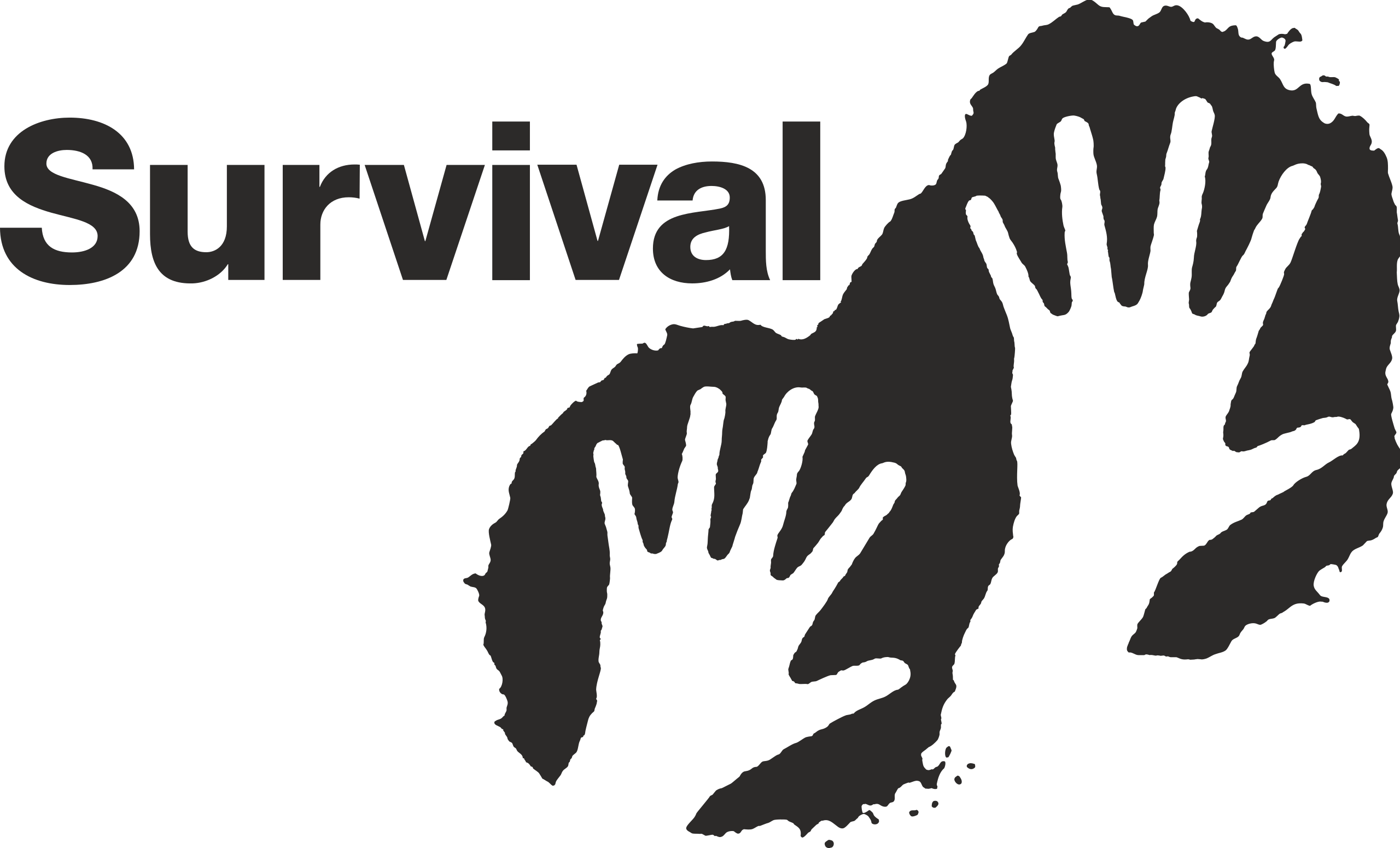 |
サバイバル・インターナショナル |
| References 1. IWGIA Annual Report 2019 [https://x.gd/TVMNx] 2. "Staff – IWGIA – International Work Group for Indigenous Affairs". 3. IWGIA - The International Work Group for Indigenous Affairs, Cultural Survival 4. Dahl, Jens (2009). IWGIA: a history - IWGIA - International Work Group for Indigenous Affairs. Copenhagen: IWGIA. p. 2008. ISBN 978-87-91563-52-2. Retrieved 21 February 2025. 5. Rishabh Kumar Dhir, Umberto Cattaneo (2020-02-03). "Implementing the ILO Indigenous and Tribal Peoples Convention No. 169: Towards an inclusive, sustainable and just future". {{cite journal}}: Cite journal requires |journal= (help) 6. "Indigenous Peoples". World Bank. Retrieved 2021-10-25. 7. "Climate action - IWGIA - International Work Group for Indigenous Affairs". Archived from the original on 2020-09-20. Retrieved 2020-10-01. 8. "Land rights - IWGIA - International Work Group for Indigenous Affairs". Archived from the original on 2020-09-21. Retrieved 2020-10-01. 9. "Indigenous rights defenders at risk - IWGIA - International Work Group for Indigenous Affairs". Archived from the original on 2020-09-26. Retrieved 2020-10-01. 10. "Global governance - IWGIA - International Work Group for Indigenous Affairs". Archived from the original on 2020-09-30. Retrieved 2020-10-01. |
参考文献 1. IWGIA年次報告書2019 [https://x.gd/TVMNx] 2. 「スタッフ – IWGIA – 国際先住民問題作業部会」 3. IWGIA - 先住民族問題国際作業部会、カルチュラル・サバイバル 4. ダール、イェンス(2009)。『IWGIA:その歴史 - IWGIA - 先住民族問題国際作業部会』。コペンハーゲン:IWGIA。p. 2008。ISBN 978-87-91563-52-2。2025年2月21日取得。 5. リシャブ・クマール・ディール、ウンベルト・カッタネオ(2020年2月3日)。「ILO先住民及び部族民条約第169号の実施:包括的で持続可能かつ公 正な未来に向けて」。{{cite journal}}: Cite journal requires |journal= (help) 6. 「先住民」. 世界銀行. 2021年10月25日閲覧. 7. 「気候変動対策 - IWGIA - 国際先住民問題作業部会」. 2020年9月20日時点のオリジナルからアーカイブ. 2020年10月1日閲覧. 8. 「土地権利 - IWGIA - 先住民問題国際作業部会」. 2020-09-21にオリジナルからアーカイブ. 2020-10-01に取得. 9. 「危険にさらされている先住民権利擁護者 - IWGIA - 先住民問題国際作業部会」. 2020-09-26にオリジナルからアーカイブ. 2020年10月1日に取得。 10. 「グローバルガバナンス - IWGIA - 国際先住民問題作業部会」. 2020年9月30日にオリジナルからアーカイブ. 2020年10月1日に取得. |
| IWGIA - Official website |
|
| https://en.wikipedia.org/wiki/International_Work_Group_for_Indigenous_Affairs |
https://x.gd/EdgK2 |
★Survival International - サバイバル・インターナショナル (Official website)
| Survival
International is a human rights organisation formed in 1969 that
describes itself as a global movement for the collective rights of
Indigenous, tribal and uncontacted peoples. Survival works in
partnership with Indigenous and tribal peoples, and offers a platform
that helps ensure that the world can hear their voices. The organisation's campaigns generally focus on tribal peoples' desires to keep their ancestral lands, which they rely on for food, housing, medicines, clothing and a sense of identity and belonging. Survival International calls these peoples “extraordinarily resilient”. The organisation aims to eradicate what it calls 'colonial land grabs' used to justify violations of human rights. It also aims to publicise harm caused to tribes by corporations and governments. Survival International states that it aims to help foster tribal people's self-determination. Survival International is in association with the United Nations Department of Global Communications and in consultative status with the UN Economic and Social Council. To ensure freedom of action, Survival accepts no corporate or government funding. It is a founding member and a signatory organization of the Accountability Charter (INGO Accountability Charter). Survival's international headquarters are in London and it has offices in Amsterdam, Berlin, Madrid, Milan, Paris, and San Francisco. |
サバイバル・インターナショナルは1969年に設立された人権団体であり、自らを先住民・部族民・未接触部族の集団的権利のための世界的な運動と称している。サバイバルは先住民や部族民と協力し、彼らの声が世界に届くよう支援するプラットフォームを提供している。 同団体の活動は主に、部族民が食料・住居・医薬品・衣類、そしてアイデンティティや帰属意識の源とする先祖伝来の土地を守りたいという願いに焦点を当てて いる。サバイバル・インターナショナルはこれらの人々を「並外れて強靭な」と評する。同団体は人権侵害を正当化する「植民地的な土地収奪」の根絶を目指 す。また企業や政府による部族への被害を公表することも目的とする。サバイバル・インターナショナルは部族の自己決定権の育成を支援すると表明している。 サバイバル・インターナショナルは国連グローバルコミュニケーション局と連携し、国連経済社会理事会との協議資格を有する。行動の自由を確保するため、企 業や政府からの資金提供は一切受け入れない。同団体はアカウンタビリティ憲章(国際非政府組織アカウンタビリティ憲章)の創設メンバーかつ署名組織であ る。国際本部はロンドンに置かれ、アムステルダム、ベルリン、マドリード、ミラノ、パリ、サンフランシスコに事務所を構える。 |
| History Survival International was founded in 1969 (as the "Primitive Peoples Fund") after an article by Norman Lewis in The Sunday Times Magazine[1] highlighted the massacres, land thefts and genocide taking place in Brazilian Amazonia.[2][3][4] In 1971, the fledgling organisation visited Brazil to observe the Fundação Nacional do Índio (FUNAI) government agency responsible for tribal peoples there.[5][6] After a name change, Survival International incorporated as an English company in 1972 and registered as a charity in 1974.[7] According to the autobiography of its first chairman, the explorer Robin Hanbury-Tenison, while travelling with the ethnobotanist Conrad Gorinsky in the Amazon in 1968,[8] "We decided that an organisation should be created to oppose these short-sighted policies; that it should be based upon principles which take into account the Indians' own desires and needs rather than our society's prejudices; that it should strive to protect the rights of Indians to their lands, their cultures and their identity; that it should foster respect for and research into their knowledge and experience so that through being recognised as experts they should be allowed to survive and we should learn from them and so contribute to our own survival. Thus the concept of Survival International was born. When, a few months later, exposure in the European press of the atrocities perpetrated in Brazil against the Brazilian Indians by the very agency created to protect them, roused public opinion, we were ready to join in the slow process of raising money and building an organisation." — Robin Hanbury-Tenison - President and co-founder of Survival International[8] It was the first in this field to use mass letter-writing, having orchestrated several campaigns in many different places throughout the world, such as Siberia, Canada, and Kenya. Several campaigns were able to bring change to government policies regarding the rights of local Indigenous people. In 2000, this form of struggle was successful in driving the Indian government to abandon their plan to relocate the isolated Jarawa tribe, after receiving 150-200 letters a day from Survival supporters around the world. Shortly before that, the governor of western Siberia imposed a five-year ban on all oil licences in the territory of the Yugan Khanty within weeks of Survival issuing a bulletin.[2] Survival was also the first organisation to draw attention to the destructive effects of World Bank projects – now recognised as a major cause of suffering in many poor countries.[2][9] Survival is the only international pro-tribal peoples organisation to have received the Right Livelihood Award, as well as the Spanish "Premio Léon Felipe" and the Italian "Medaglia della Presidenza della Camera dei Deputati".[2][10] |
歴史 サバイバル・インターナショナルは、ノーマン・ルイスがサンデー・タイムズ・マガジン[1] に掲載した記事で、ブラジルのアマゾン地域で起こっている虐殺、土地の奪取、ジェノサイドを指摘したことを受け、1969年に「プリミティブ・ピープル ズ・ファンド」として設立された。[2][3][4] 1971年、この新組織は、ブラジルの先住民を担当する政府機関である国立先住民財団(FUNAI)を視察するためにブラジルを訪問した。[5][6] 名称変更後、サバイバル・インターナショナルは1972年に英国企業として法人化され、1974年に慈善団体として登録された。[7] 初代会長である探検家ロビン・ハンベリー・テニソンの自伝によると、1968年に民族植物学者コンラッド・ゴリンスキーとアマゾンを旅していた際、 [8] 「我々は、こうした近視眼的な政策に対抗する組織を創設すべきだと決断した。その組織は、我々の社会の偏見ではなく、先住民自身の願望と必要を考慮した原 則に基づくべきだ。先住民の土地、文化、アイデンティティに対する権利を保護するよう努め、 彼らの知識と経験への敬意と研究を促進し、専門家として認められることで生存を許され、我々が彼らから学び自らの生存に貢献できるようにすべきだと決めた のだ。こうしてサバイバル・インターナショナルの構想が生まれた。数か月後、ブラジル先住民を保護するために設立された機関による残虐行為が欧州メディア で暴露され世論が沸騰した時、我々は資金調達と組織構築という長いプロセスに加わる準備ができていた。」 —ロビン・ハンベリー=テニソン - サバイバル・インターナショナル会長兼共同創設者[8] この分野で初めて大量の書簡送付を活用し、シベリア、カナダ、ケニアなど世界各地で複数のキャンペーンを組織した。いくつかのキャンペーンは、現地先住民 の権利に関する政府政策に変化をもたらすことに成功した。2000年には、世界中のサバイバル支援者から1日150~200通の手紙が寄せられた結果、こ の闘争形態が成功を収め、インド政府は孤立したジャラワ族の移住計画を断念した。その直前の2000年には、サバイバルが報告書を発表してから数週間で、 西シベリア州知事がユガン・ハンティ族の居住地域における全ての石油採掘許可を5年間禁止した[2]。サバイバルはまた、世界銀行プロジェクトの破壊的影 響に最初に注目した組織でもある。これは現在、多くの貧しい国々における苦悩の主要な原因として認識されている[2]。[9] サバイバルは、先住民族支援を掲げる国際組織として唯一、ライト・リヴィリッジ賞(Right Livelihood Award)を受賞している。さらにスペインの「レオン・フェリペ賞(Premio León Felipe)」、イタリアの「下院議長メダル(Medaglia della Presidenza della Camera dei Deputati)」も受賞している。[2][10] |
| Structure and aims Survival International works for Indigenous peoples' rights on three complementary levels: education, advocacy and campaigns. It also offers tribal people a platform to address the world, while connecting with local Indigenous organisations, with a focus on tribal peoples under more urgent threat from contact with the outside world.[2][11] The educational programs are aimed at people in the Western world, aiming at "demolishing the myth that tribal people are relics, destined to perish through 'progress'". Survival seeks to promote respect for their cultures and explain their relevance today in preserving their way of life.[12] "If we want to help societies our first job is to listen, rather than to dictate what we think they need, and we must be prepared to be surprised. This is not just to do with remote tribal peoples: it's of vital relevance to all in a world where ideas of multiculturalism are misunderstood and under attack and where some increasingly want to force their views on others." — Stephen Corry, former Director of Survival International, April 2007[13] Survival has supporters in 100 countries. Its materials are published in many languages throughout the world. It is a registered charity in the United Kingdom and the equivalent in Germany, France, Italy, Spain, and the United States, and can receive tax-free donations in the Netherlands. Survival refuses government funding, depending exclusively on public support, in order to ensure freedom of action.[2] All the people sent into the field belong to Survival International staff, none are sponsored volunteers or visitors of any kind. Overseas projects are carried and managed by tribes themselves.[14] |
組織構造と目的 サバイバル・インターナショナルは、先住民の権利のために三つの補完的なレベルで活動する。教育、擁護活動、キャンペーンである。また、部族民が世界に訴 えるためのプラットフォームを提供すると同時に、現地の先住民組織と連携し、外部世界との接触により差し迫った脅威に直面している部族民に焦点を当ててい る。[2] [11] 教育プログラムは西洋世界の人々を対象とし、「部族民は『進歩』によって滅びゆく遺物である」という神話を打ち壊すことを目指している。サバイバルは彼ら の文化への敬意を促進し、その生活様式を守る上で現代における彼らの意義を説明しようとしている。[12] 「社会を助けたいなら、まず耳を傾けるべきだ。我々の考える必要性を押し付けるのではなく、驚きを受け入れる覚悟が必要だ。これは遠隔地の部族社会に限っ た話ではない。多文化主義の理念が誤解され攻撃され、自らの見解を他者に押し付けようとする動きが強まる現代世界において、これは全ての人にとって極めて 重要な課題だ」 —スティーブン・コリー(サバイバル・インターナショナル元代表)、2007年4月[13] サバイバルは100カ国に支援者を擁する。その資料は世界中で多言語で出版されている。英国では登録慈善団体であり、ドイツ、フランス、イタリア、スペイン、米国でも同等の地位を有し、オランダでは免税寄付を受けられる。 サバイバルは行動の自由を確保するため、政府資金を拒否し、公的支援のみに依存している[2]。現地に派遣される人員は全員サバイバル・インターナショナ ルの職員であり、スポンサー付きのボランティアや訪問者は一切いない。海外プロジェクトは部族自身によって運営・管理されている[14]。 |
| Tribes There are more than 476 million tribal people worldwide, living in more than 90 countries around the world. These include at least 196 uncontacted peoples in 10 countries. Survival International supports these endangered tribes on a global level, with campaigns established in the Americas, Africa, the Pacific and Asia.[15] Most of them have been persecuted and face genocide by diseases, relocation from their homes by logging and mining, and eviction by settlers.[16] "Uncontacted peoples are not passive or ignorant. They know about outsiders, they are making a choice to reject and resist contact, and they are powerfully supported by Indigenous neighbors." Caroline Pearce, Executive Director, Survival International Survival believes that Indigenous rights to land ownership, although recognised by international law, are not effectively respected, with tribes being invaded by activities such as oil and mineral mining, logging, cattle ranching, private or government "development" schemes such as building of roads and dams, or for nature reserves and game parks. Beyond these economic causes for exploitive invasions, Survival highlights ignorance and racism that sees tribal peoples as backward and primitive. Survival believes that in the long-term, public opinion is the most effective force for change.[2][17] The impact of the outside world on the existence of Indigenous peoples and their cultures is described as being very dramatic. In Siberia, only 10% of the tribal peoples live a nomadic or semi-nomadic life, compared to 70% 30 years ago.[18] In 2025, Survival published the first comprehensive report on uncontacted peoples worldwide.[19] It found that almost half of the world’s uncontacted peoples could be wiped out within ten years if governments and companies didn’t take action. In Brazil – where Survival has found evidence of 124 uncontacted peoples – there are about 400 speakers for 110 languages.[20] For authors such as Daniel Everett, this phenomenon represents a fundamental assault on the existence of peoples, as language expresses the way a group of people experience reality in a unique way, and it is a part of our common heritage. Ranka Bjeljac-Babic, lecturer and specialist in the psychology of language, describes an intrinsic and causal link between the threat of biological diversity and cultural diversity.[21] The assault on Indigenous customs and traditions is described as part of a larger assault on life, with its historical roots in colonization. Survival's report Progress can Kill highlights that the invasion of the Americas and Australia by Europeans eliminated 90% of the Indigenous population on these continents.[22] The threat of genocide continues.[23] Most fundamentally, Survival believes that it is the respect for the right to keep their land that may allow them to survive. The issues of human rights and freedom depend on the land on which they can subsist and develop according to their own culture. Interference with this basic need endangers their capacity to live sustainably.[17] In January 2019, the newly elected president of Brazil Jair Bolsonaro stripped the Indigenous affairs agency FUNAI of the responsibility to identify and demarcate Indigenous lands. He argued that those territories have very tiny isolated populations and proposed to integrate them into the larger Brazilian society.[24] According to the Survival International, "Taking responsibility for Indigenous land demarcation away from FUNAI, the Indian affairs department, and giving it to the Agriculture Ministry is virtually a declaration of open warfare against Brazil's tribal peoples."[25] |
部族 世界には4億7600万人以上の部族民がおり、90カ国以上に居住している。これには10カ国に少なくとも196の未接触部族が含まれる。サバイバル・イ ンターナショナルは、アメリカ大陸、アフリカ、太平洋、アジアで展開するキャンペーンを通じて、こうした危機に瀕した部族を世界規模で支援している。 [15] 彼らの大半は迫害を受け、疾病によるジェノサイド、伐採や鉱業による居住地からの移住、入植者による立ち退きに直面している。[16] 「未接触部族は受動的でも無知でもない。彼らは外部者の存在を知り、接触を拒絶し抵抗する選択をしている。そして近隣の先住民から強力な支援を受けている」 キャロライン・ピアース、サバイバル・インターナショナル事務局長 サバイバルは、先住民の土地所有権が国際法で認められているにもかかわらず、石油・鉱物採掘、伐採、牧畜、道路やダム建設といった民間・政府主導の「開 発」計画、あるいは自然保護区や狩猟公園の設置などによる部族への侵入が横行し、権利が実質的に尊重されていないと考える。こうした搾取的な侵入の経済的 要因に加え、サバイバルは部族民を遅れた原始的民族と見なす無知と人種主義を問題視している。サバイバルは、長期的には世論こそが変化をもたらす最も効果 的な力だと考えている。[2][17] 外部世界が先住民の存続と文化に与える影響は極めて劇的だ。シベリアでは、遊牧または半遊牧生活を営む部族民はわずか10%で、30年前の70%から激減 している。[18] 2025年、サバイバルは世界中の未接触部族に関する初の包括的報告書を発表した。[19] それによると、政府や企業が対策を講じなければ、世界の未接触部族のほぼ半数が10年以内に消滅する可能性があるという。 ブラジルでは——サバイバルが124の未接触部族の存在を確認している国だ——110の言語を話す約400人の話者が存在する。[20] ダニエル・エバレットら研究者にとって、この現象は人々の存在そのものへの根本的攻撃である。言語は集団が現実を独自に体験する方法を表現し、人類共通の 遺産の一部だからだ。言語心理学の専門家ランカ・ビェリャック=バビッチは、生物多様性と文化多様性の脅威に内在的かつ因果的な関連性があると述べる。 [21] 先住民の慣習や伝統への攻撃は、植民地化に歴史的根源を持つ、生命全体への攻撃の一部として描かれる。サバイバルの報告書『進歩は殺す』は、ヨーロッパ人 によるアメリカ大陸とオーストラリアへの侵入が、これらの大陸の先住民人口の90%を消滅させたことを強調している。[22] ジェノサイドの脅威は続いている。[23] 最も根本的に、サバイバルは、彼らの土地を保持する権利への尊重こそが、彼らの生存を可能にするかもしれないと信じている。人権と自由の問題は、彼らが自 らの文化に従って生存し発展できる土地に依存している。この基本的ニーズへの干渉は、持続可能な生活能力を危険に晒す。[17] 2019年1月、新たに選出されたブラジル大統領ジャイール・ボルソナロは、先住民問題庁(FUNAI)から先住民の土地を特定・境界設定する責任を剥奪 した。彼は、それらの地域にはごく少数の孤立した集団しかおらず、より大きなブラジル社会に統合すべきだと主張した[24]。サバイバル・インターナショ ナルによれば、「先住民土地の境界設定責任を先住民問題担当機関であるフナイから農業省に移管することは、事実上、ブラジルの部族民に対する公然たる戦争 宣言である」[25]。 |
| Campaigns Survival International campaigns alongside Indigenous people around the world. It’s current campaigns are in the Americas, Africa and Asia and the Pacific.[26] They select their cases based on a criterion the organisation has established, which depends on a wide range of factors, such as the reliability and continuity of the information, the gravity of the situation the tribe in question is facing, the degree to which they believe their work can make a real difference, the degree to which improvements in this area would have a knock on effect for others, whether any other organisation is already working on the case, and whether they are sure of what the people themselves want.[17] A common threat to the tribes for which Survival campaigns is the invasion of their lands for exploration of resources.[15][17] This invariably leads to forced relocation, loss of sustainability and forced changes in their way of living. Usually, this is accompanied by diseases from the contact with the outsiders for which they have an unprepared immune system – this threat alone can wipe out entire tribes.[23] Logging and/or cattle ranchers have affected most of these tribes, from South America, Africa, to Australasia. The Arhuaco, in Colombia, have drug plantations, associated with crossfire from guerilla wars between cartel and government interests. The Ogiek, in Kenya, have tea plantations, and the Amungme in Indonesia, the San in Botswana, the Dongria Kondh in India, and the Palawan in the Philippines have mining fields. 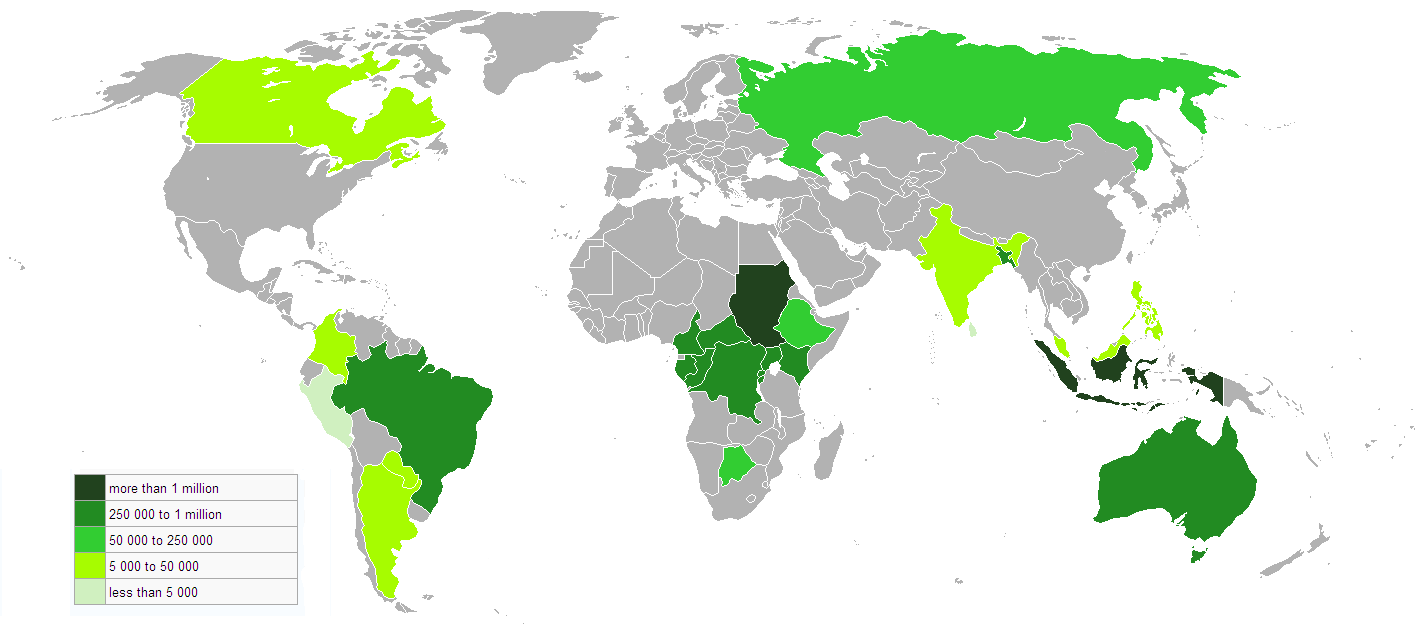 Countries which have Indigenous peoples for whom Survival campaigns. This map represents about 5 million Indigenous people. There are over 300 million Indigenous people in the world, with an estimated over 100 uncontacted tribes.[15] Survival international has also pointed out in their campaigns against the assault on their way of living the effect of the work of missionaries.[23] The Arhuaco, Ayoreo, Aborigines, the Innu, and several tribes in West Papua have all suffered direct attacks on their culture from what, in the perspective of Survival, may constitute good intention, but nevertheless is destructive to their lives.[15][27] The children of the Khanty and Wanniyala-Aetto have been kidnapped to be raised in foreign religions and culture. In the long run, these practices are successful in assimilating and destroying a group of people. Besides suffering the genocide brought about through disease and hunger (which is the result of losing their natural environment and having fertile soil stolen from them), Survival says some tribes have suffered campaigns of direct assassination.[15] Most tribes in South America, such as the Awá, Akuntsu, Guaraní, and the Yanomami, have been murdered on sight by multinational workers, ranchers and gunmen for hire, while tribes in Africa and Asia have suffered waves of murder at the hands of the government. Survival International has pointed to the tribe Akuntsu, of which only five members still remain, as an example of what this threat represents: the eventual genocide of a whole people.[28][29] Survival International has called attention to the rise in suicide in tribal peoples such as the Innu, Australian Aborigines, and the Guarani, as a consequence of outside interference with the tribes' cultures and direct persecution. Suffering from the trauma of forced relocation, many tribal people find themselves in despair living in an environment they are not used to, where there is nothing useful to do, and where they are treated with racist disdain by their new neighbours. Other social consequences from this displacement have been pointed out to alcoholism and violence, with campaigns reporting the cases of the Innu, Mursi, Bodi, Konso, and Wanniyala-Aetto. Tribal peoples are also more vulnerable to sexual exploitation. Among the tribes with whom Survival International has campaigned, there has been reported rapes of girls and women by workers of invading companies in the Indigenous tribes of Penan, West Papuan tribes, Jummas, and Jarawa.[15] The government role in these territories varies. Most Brazilian tribes are protected under law, while in reality there has been resistance in policies and strong support for enterprises that carry out these threats on their existence. In Africa, the San tribes and other tribes have been persecuted with beating and torture to force relocation, as well as murder in the Nuba, and in the Bangladesh, Asia, with the Jummas.[15][30] Sometimes governments offer compensations that are believed by Survival to be unwanted alternatives for the tribes, portrayed as "development".[31] In April 2012, Survival International launched a worldwide campaign, backed by actor Colin Firth, to protect the Awa-Guajá people of Brazil, which the organization considers to be the "earth's most threatened tribe".[32] Decolonisation of conservation In late 2015, Survival International started the Stop the Con campaign, which seeks to raise awareness about negative impacts of traditional conservation policies on tribal peoples.[33] This campaign is part of Survival International's larger campaign to decolonise conservation conservation.[34][35] Survival argues that since the creation of the first National Parks at the end of the 19th century, governments and large conservation organizations have been evicting Indigenous peoples from their lands in the name of conservation. Survival argues that Indigenous peoples are the world's best conservationists and that they and their rights must be at the centre of the fight against environmental destruction and climate change. Botswana Survival International has campaigned for land rights for the San/Bushmen of the Central Kalahari Game Reserve since the 1980s. It supported them in their successful high court case[36] against the Botswana government which had evicted them from the reserve in 2002. It was the longest court case in Botswana’s legal history and lasted over four years. In a landmark judgment[37] delivered in December 2006 the judges ruled that the government had acted illegally and unconstitutionally when it evicted the San and banned them from hunting. Since the ruling many San/Bushmen returned to their ancestral territories in the Central Kalahari Game Reserve despite the fact the government made life as difficult as possible[38] for them by refusing to provide basic services such as access to water and a mobile health clinic and forcing them to apply for permits to return to their ancestral land. Survival supported a group of San to take the government to court in 2010 over its refusal to allow them to access a water borehole[39] in their community in the Central Kalahari Game Reserve. They lost the case and successfully appealed[40] to the high court which ruled in 2011 that the San “being the lawful occupiers, do not require a water right for the use of the Mothomelo borehole, or indeed any other current or future borehole on land in the CKGR, for domestic purposes”. The current President of Botswana, Duma Boko, who was part of the Bushmen’s legal team in the 2006 court case, stated that his government is “committed to placing human rights at the core of its policies”. In March 2025 the Minister of Justice announced the appointment of an Inter-Ministerial Committee to examine the situation of San/Bushmen, including those who live in the Central Kalahari Game Reserve. He told Parliament that it “will work to find sustainable solutions to longstanding human rights concerns of Basarwa [San/Bushmen] while promoting national unity in diversity”.[41][42] Electric vehicles In 2024, Survival published a report on how the demand for electric cars is destroying uncontacted Indigenous people’s lives and lands in Indonesia.[43] They are calling for electric vehicle companies to pledge that none of the minerals they buy ever comes from the lands of uncontacted Indigenous people in Halmahera.[44] Uncontacted peoples In 2025, Survival published the first comprehensive report on uncontacted peoples worldwide.[45] It found robust evidence of 196 uncontacted peoples living in ten countries across South America, Asia and the Pacific. However, it also found that almost half of those peoples could be wiped out within ten years if governments and companies don’t take action. Survival’s campaign called for industry associations, asking them to keep resources from uncontacted peoples’ land out of their members’ supply chains.[46] |
キャンペーン サバイバル・インターナショナルは世界中の先住民と共に活動している。現在の活動地域はアメリカ大陸、アフリカ、アジア・太平洋地域である。[26] 彼らは、組織が定めた基準に基づいて案件を選定する。この基準は、情報の信頼性と継続性、対象部族が直面する状況の深刻さ、自らの活動が真の変化をもたら し得る度合い、当該分野の改善が他へ波及効果をもたらす可能性、他の組織が既に案件に取り組んでいるか否か、そして対象民族自らが何を望んでいるかを確実 に把握しているか否かなど、幅広い要素に依存する。[17] サバイバルが支援する部族にとって共通の脅威は、資源探査のための土地侵攻である。[15][17] これは必ず強制移住、持続可能性の喪失、生活様式の変化を招く。通常、これには外部者との接触による疾病が伴う。彼らの免疫システムはこうした病気に備え ておらず、この脅威だけで部族全体が壊滅することもある。[23] 南米、アフリカ、オセアニアに至るまで、これらの部族の大半は伐採業や牧畜業者による影響を受けている。コロンビアのアルワコ族は麻薬栽培地に直面し、カ ルテルと政府勢力のゲリラ戦争による銃撃戦の巻き添えにもなっている。ケニアのオギエク族は茶畑に、インドネシアのアムンメ族、ボツワナのサン族、インド のドングリア・コンド族、フィリピンのパラワン族は鉱山に囲まれている。  サバイバル・インターナショナルが支援活動を行う先住民が存在する国々。この地図は約500万人の先住民を表す。世界には3億人以上の先住民がおり、未接触部族は100以上と推定される。[15] サバイバル・インターナショナルは、生活様式への攻撃に対するキャンペーンにおいて、宣教師の活動が及ぼす影響も指摘している[23]。アルワコ族、アヨ レオ族、アボリジニ、イヌ族、西パプアの複数の部族は、サバイバルの視点では善意に基づく行為であっても、彼らの生活に破壊的である文化への直接攻撃に よって苦悩してきた。[15][27] カンティ族やワニヤラ・アエット族の子供たちは、異教の宗教や文化で育てるために誘拐されてきた。長期的には、こうした慣行は集団の同化と破壊に成功して いる。 サバイバルによれば、病気や飢餓(自然環境の喪失と肥沃な土壌の奪取が原因)によるジェノサイドに加え、一部の部族は苦悩する形で直接的な暗殺作戦の被害 にも遭っている。[15] アワ族、アクンツ族、グアラニー族、ヤノマミ族など南米のほとんどの部族は、多国籍企業の労働者、牧場主、雇われの殺し屋によって即座に殺害されてきた。 一方、アフリカやアジアの部族は政府の手による殺戮の波に苦悩してきた。サバイバル・インターナショナルは、わずか5名しか残っていないアクンツ族を例に 挙げ、この脅威が最終的に民族全体のジェノサイドを意味すると指摘している。[28][29] サバイバル・インターナショナルは、インヌ族、オーストラリア先住民、グアラニ族などの部族社会において、外部による文化干渉と直接的な迫害の結果として 自殺が増加していることに注目を促している。強制移住のトラウマにより苦悩する多くの部族民は、慣れない環境で生きることに絶望している。そこには有意義 な仕事もなく、新たな隣人からは人種差別的な軽蔑の眼差しを向けられる。この移住がもたらす他の社会的影響として、アルコール依存症や暴力も指摘されてお り、インヌ族、ムルシ族、ボディ族、コンソ族、ワニヤラ・アエット族の事例がキャンペーンで報告されている。部族民は性的搾取にもより脆弱だ。サバイバ ル・インターナショナルが支援活動を行った部族では、ペナン族、西パプア部族、ジュマ族、ジャラワ族といった先住民部族において、進出企業の労働者による 少女や女性へのレイプが報告されている。[15] これらの地域における政府の役割は様々だ。ブラジルの部族の大半は法律で保護されているが、実際には政策上の抵抗があり、彼らの存在を脅かす企業への強力 な支援が行われている。アフリカでは、サン族や他の部族が移住を強制するために殴打や拷問による迫害を受け、ヌバ族では殺害も発生している。またアジアの バングラデシュではジュマ族が同様の被害に遭っている。[15][30] 政府が提示する補償策は、生存国際が「部族にとって望ましくない代替案」と指摘するケースがある。これらは「開発」と称して提示される。[31] 2012年4月、生存国際は俳優コリン・ファースの支援を得て、ブラジルのアワ・グアジャ族保護を目的とした世界規模キャンペーンを開始した。同組織はアワ・グアジャ族を「地球上で最も危機に瀕した部族」と位置付けている。[32] 保護活動の脱植民地化 2015年末、サバイバル・インターナショナルは「ストップ・ザ・コン」キャンペーンを開始した。これは従来の保護政策が部族民に与える悪影響への認識を 高めることを目的としている。[33] このキャンペーンは、保護活動の脱植民地化を目指す同団体のより大規模な運動の一環である。[34][35] サバイバルは、19世紀末に最初の国立公園が創設されて以来、政府や大規模な保護団体が「保護」の名のもとに先住民を土地から追い出してきたと主張する。 先住民こそが世界最高の自然保護活動者であり、環境破壊や気候変動との闘いにおいて、彼らとその権利が中心に置かれなければならないと訴えている。 ボツワナ サバイバル・インターナショナルは1980年代から、中央カラハリ野生動物保護区に住むサン族/ブッシュマンの土地権利を求める運動を展開してきた。 2002年にボツワナ政府が彼らを保護区から追い出した件で、同団体はサン族が最高裁で勝訴した訴訟[36]を支援した。この訴訟はボツワナ司法史上最長 の裁判となり、4年以上続いた。2006年12月に下された画期的な判決[37]で、裁判官は政府がサン族を追放し狩猟を禁止した行為は違法かつ憲法違反 であると裁定した。判決後、多くのサン族/ブッシュマンは中央カラハリ保護区内の祖先の土地へ帰還した。政府が水供給や移動健康診療所といった基本サービ スの提供を拒否し、帰還許可の申請を強制するなど、可能な限り生活を困難にしようとしたにもかかわらずである。 サバイバル・イン・ザ・ワイルドは2010年、中央カラハリ野生動物保護区内のコミュニティにある井戸へのアクセスを政府が許可しなかった件で、サン族の グループが政府を提訴するのを支援した。彼らは裁判では敗訴したが、高等裁判所に上訴[40]し、2011年に勝訴した。高等裁判所は、サン族は「合法的 な占有者であるため、モトメロ井戸、あるいはカラハリ中央野生動物保護区内の土地にある現在および将来のいかなる井戸も、家庭用として使用する権利を必要 としない」と判決した。 2006年の裁判でサン族の弁護団の一員だった現ボツワナ大統領ドゥマ・ボコは、自国政府が「人権を政策の中核に据えることを約束している」と述べた。 2025年3月、司法大臣は中央カラハリ野生動物保護区を含むサン族/ブッシュマンの状況を検討する省庁間委員会の設置を発表した。同大臣は議会に対し、 「多様性の中の国民的結束を促進しつつ、バサルワ(サン/ブッシュマン)の長年にわたる人権問題に対する持続可能な解決策を見出すために活動する」と述べ た。[41][42] 電気自動車 2024年、サバイバルは電気自動車の需要がインドネシアの未接触先住民の生活と土地を破壊している実態を報告した。[43] 同団体は電気自動車メーカーに対し、ハルマヘラ島の未接触先住民の土地から採掘された鉱物を一切使用しないことを誓約するよう求めている。[44] 未接触先住民 2025年、サバイバルは世界中の未接触先住民に関する初の包括的報告書を発表した。[45] 南米、アジア、太平洋地域の10カ国に196の未接触先住民集団が確実に存在することを裏付ける証拠を発見した。 |
| Media attention Survival International has received attention in the media over the years with the campaigns and work of volunteer supporters. Celebrity endorsements include Richard Gere, who has spoken up for the Jumma of Bangladesh, Julie Christie, who gave a Radio 4 appeal on behalf of the Khanty of Siberia, Judi Dench, who warned of the events surrounding the Arhuaco of Colombia, and Colin Firth, who spoke out against the eviction of the San tribe,[47][48] and in favour of the Awa-Guajá people.[32] However, the media have not always been sympathetic towards the organisation. In 1995, the Independent Television Commission banned one of Survival International's advertisements, citing the Broadcasting Act 1990, which states that organisations cannot advertise their work if it is wholly or mainly of a political nature.[49] The ad was broadcast on the music cable channel The Box and the MTV satellite offshoot VH-1. It featured Richard Gere urging viewers to help to stop the slaughter and exploitation of tribal people. Another controversy ensued after an article in The Observer cast doubt on Survival International's reporting of an uncontacted tribe in Peru, which included a picture with tribesmen firing arrows up at an aircraft.[50][51] After a heated confrontation that dragged for a couple of months, with threats of taking Survival International to court for libel, The Observer ended up conceding in August 2008 that it had got the story wrong. In a clarification, the newspaper stated: "While The Observer cannot be responsible for content of other media it does have a duty under the Editors' Code not to publish 'inaccurate, misleading or distorted information'. It failed in that duty here."[51] The previous Government of Botswana, with whom Survival International has had a long-standing disagreement over the government's treatment of the San people in the Central Kalahari Game Reserve, has complained about uneven coverage in the mainstream media.[52] The San have challenged the government in court several times regarding their right to remain on their land without interference.[53] Ian Khama, the former President of Botswana, stated that Survival International is "denying them and especially their children opportunities to grow with the mainstream", forcing Indigenous peoples into maintaining "a very backward form of life".[54] It has been alleged that the Botswana government "has instructed all departmental heads in the state media to ensure that any negative reporting on the controversial relocations from the Central Kalahari Game Reserve (CKGR) should be contrasted strongly with freshly-sought government statements."[51] However, the current President Duma Boko was part of the Bushmen’s legal team in the 2006 court case, and is supportive of Survival's campaigns. In 2005, Survival published the book There You Go![55] (Oren Ginzburg), which depicted a tribal society being harmed by development. In the book's foreword, Stephen Corry wrote: "The 'development' of tribal peoples against their wishes – really to let others get their land and resources – is rooted in 19th century colonialism ('We know best') dressed up in 20th century 'political correct' euphemism. Tribal peoples are not backward: they are independent and vibrant societies which, like all of us always, are constantly adapting to a changing world. The main difference between tribal peoples and us is that we take their land and resources, and believe the dishonest, even racist, claim that it's for their own good. It's conquest, not development. If you really want to understand what's going on, read this book." |
メディアの注目 サバイバル・インターナショナルは、長年にわたりボランティア支援者たちのキャンペーンや活動を通じてメディアの注目を集めてきた。著名人の支援者には、 バングラデシュのジュマ族のために声を上げたリチャード・ギア、シベリアのハンティ族のためにBBCラジオ4で支援を呼びかけたジュリー・クリスティ、コ ロンビアのアルワコ族を取り巻く事態を警告したジュディ・デンチ、サン族の立ち退きに反対したコリン・ファースなどがいる。[47][48] またアワ・グアジャ族を支持する発言も行った[32]。 しかしメディアが常に同団体に好意的だったわけではない。1995年には独立テレビ委員会がサバイバル・インターナショナルの広告を禁止した。根拠は 1990年放送法で、組織が政治的性質を完全にまたは主に有する活動を広告してはならないと定めているためだ。[49] この広告は音楽専門ケーブルチャンネル「ザ・ボックス」とMTV系列衛星チャンネル「VH-1」で放映された。リチャード・ギアが視聴者に部族民の虐殺と 搾取を止めるよう訴える内容だった。 別の論争は『オブザーバー』紙の記事が引き金となった。同紙はペルーの未接触部族に関するサバイバル・インターナショナルの報告に疑問を呈し、部族民が航 空機に向かって矢を放つ写真も掲載したのである。[50][51] 数ヶ月にわたる激しい対立の末、サバイバル・インターナショナルを名誉毀損で訴えると脅したオブザーバー紙は、2008年8月に記事の内容が誤りだったと 認めた。同紙は訂正記事で「オブザーバー紙は他メディアの内容に責任を負えないが、編集者規範に基づき『不正確、誤解を招く、歪曲された情報』を掲載しな い義務がある。今回はその義務を果たせなかった」と述べた。[51] ボツワナ前政権は、中央カラハリ野生動物保護区におけるサン族への政府の扱いを巡り、サバイバル・インターナショナルと長年にわたり意見の相違があった が、主流メディアの偏った報道について苦情を申し立てている。[52] サン族は、干渉を受けずに自らの土地に留まる権利について、政府を幾度も法廷で訴えてきた。[53] イアン・カーマ前ボツワナ大統領は、サバイバル・インターナショナルが「彼ら、特に子供たちが主流社会と共に成長する機会を否定している」と述べ、先住民 に「非常に遅れた生活様式」の維持を強いていると主張した。[54] ボツワナ政府は「中央カラハリ野生動物保護区(CKGR)からの移住問題に関する否定的な報道については、政府が新たに求めた声明と強く対比させるよう、 国営メディアの全部門長に指示した」と非難されている。[51] しかし現大統領ドゥマ・ボコは、2006年の裁判でブッシュマンの弁護団の一員であり、サバイバルの運動を支持している。 2005年、サバイバルは『There You Go!』[55](オーレン・ギンズバーグ著)を出版した。これは開発によって害される部族社会を描いた本である。同書の序文でスティーブン・コリーはこ う記している。「部族民の意思に反した『開発』——実態は他者に土地と資源を奪わせる行為——は、19世紀の植民地主義(「我々が最もよく知っている」) が20世紀の『政治的正しさ』という婉曲表現で装われたものに根ざしている。部族民は遅れているわけではない。彼らは独立した活力ある社会であり、私たち 皆が常にそうであるように、変化する世界に絶えず適応している。部族民と私たちの主な違いは、私たちが彼らの土地と資源を奪い、それが彼らのためだという 不誠実で人種差別的な主張を信じている点だ。これは開発ではなく征服である。現状を本当に理解したいなら、この本を読むべきだ。」 |
Cultural Survival Declaration on the Rights of Indigenous Peoples Friends of Peoples Close to Nature Songs for Survival |
カルチュラル・サバイバル 先住民の権利に関する宣言 自然に近い人々の友 生存のための歌 |
| References | |
| Sources Hanbury-Tenison, Robin (1991). Worlds Apart: An Explorer's Life. Arrow Books. (First published by Granada, 1984) |
出典 ハンベリー=テニソン、ロビン(1991)。『隔てられた世界:探検家の人生』。アローブックス刊。(初版はグラナダ社より1984年に出版) |
| External links Official website |
★ Cultural Survival- カルチュラル・サバイバル
| Cultural Survival is
an Indigenous-led nonprofit organization (501(c)(3)), based in
Cambridge, Massachusetts, United States, that advocates for the rights
of Indigenous Peoples around the world. Founded in 1972, the
organization supports Indigenous communities in achieving
self-determination, preserving their cultures, languages, and
traditional knowledge, and strengthening political and environmental
resilience. As of 2025, Cultural Survival holds a four-star rating from
Charity Navigator.[1] |
カルチュラル・サバイバルは、アメリカ合衆国マサチューセッツ州ケンブ
リッジに本部を置く先住民主導の非営利団体(501(c)(3))であり、世界中の先住民の権利擁護を推進している。1972年に設立されたこの団体は、
先住民コミュニティが自己決定権を達成し、文化・言語・伝統的知識を保存し、政治的・環境的回復力を強化することを支援している。2025年現在、カル
チュラル・サバイバルはチャリティ・ナビゲーターから四つ星の評価を受けている。[1] |
| Mission and Vision Cultural Survival’s mission is to "advocate for Indigenous Peoples' rights and supports Indigenous communities’ self-determination, cultures and political resilience." Cultural Survival envisions "a future that respects and honors Indigenous Peoples' inherent rights and dynamic cultures, deeply and richly interwoven in lands, languages, spiritual traditions, and artistic expression, rooted in self-determination and self-governance." |
使命とビジョン カルチュラル・サバイバルの使命は、「先住民の権利を擁護し、先住民コミュニティの自己決定権、文化、政治的回復力を支援すること」である。カルチュラ ル・サバイバルは、「土地、言語、精神的伝統、芸術的表現に深く豊かに織り込まれた、先住民の固有の権利とダイナミックな文化を尊重し称える未来」を構想 する。それは自己決定と自治に根ざしたものである。 |
| History Founded by David Maybury-Lewis, Evon Zartman Vogt, and Orlando Patterson —professors at Harvard University — and Pia Maybury‑Lewis[2] (wife of David Maybury-Lewis), the organization originated in response to their fieldwork among the Xerente and Xavante peoples in Brazil during the 1950s and 60s. Their experiences observing the threats posed by Amazonian development inspired the creation of a global advocacy organization for Indigenous human rights. Cultural Survival’s first office opened on March 2, 1972, on the fifth floor of Harvard’s Peabody Museum of Archaeology and Ethnology. Early leadership included David Maybury‑Lewis as President, Orlando Patterson as Treasurer, Evon Z. Vogt Jr. as Clerk, and Pia Maybury‑Lewis as co-founder. Today, its main office is located at 2067 Massachusetts Avenue, Cambridge, on Massachusett land. |
歴史 この組織は、ハーバード大学の教授であるデビッド・メイバリー=ルイス、エヴォン・ザートマン・ヴォクト、オルランド・パターソン、そしてピア・メイバ リー=ルイス[2](デビッド・メイバリー=ルイスの妻)によって設立された。その起源は、1950年代から60年代にかけて、彼らがブラジルのシェレン テ族とシャバンテ族の間で実施したフィールドワークにある。アマゾン開発による脅威を目の当たりにした彼らの経験が、先住民の人権を守るための世界的な擁 護団体の創設につながったのである。 カルチュラル・サバイバルの最初の事務所は、1972年3月2日にハーバード大学ピーボディ考古学民族学博物館の5階に開設された。初期の指導者には、デ イヴィッド・メイバリー=ルイスが会長、オルランド・パターソンが会計、エヴォン・Z・ヴォクト・ジュニアが書記、ピア・メイバリー=ルイスが共同創設者 として名を連ねていた。現在、本部はマサチューセッツ州ケンブリッジのマサチューセッツ・アベニュー2067番地にある。 |
| Indigenous Leadership The organization became Indigenous‑led in 2011 when Suzanne Benally (Navajo and Santa Clara Tewa) was appointed Executive Director, becoming its first Indigenous leader. She was succeeded in 2019 by Galina Angarova (Buryat), and the current Executive Director, Aimee Roberson (Choctaw & Chickasaw), assumed the role in July 2024. |
先住民族のリーダーシップ この組織は2011年、スザンヌ・ベナリー(ナバホ族とサンタクララ・テワ族)が事務局長に任命され、初の先住民族リーダーとなったことで先住民族主導の 組織となった。彼女は2019年にガリーナ・アンガロワ(ブリヤート族)に後を継ぎ、現在の事務局長であるエイミー・ロバーソン(チョクトー族とチカソー 族)は2024年7月にその職に就いた。 |
| Programs Cultural Survival executes a holistic strategy comprising grantmaking, capacity building, advocacy, Indigenous communications, and Cultural Survival Bazaars. Programmatic priorities include climate change solutions, land rights and livelihoods, cultural and language revitalization, and Indigenous community media. A cross-cutting focus is placed on Indigenous women and youth. Grantmaking Keepers of the Earth Fund (KOEF): This Indigenous-led fund provides small grants—up to $12,000—to Indigenous organizations, collectives, and traditional governments. Projects address a range of priorities, including women and youth leadership, land stewardship, climate resilience, biodiversity, food sovereignty, and language revitalization. Indigenous Community Media Fund: This fund supports Indigenous community radio stations and media initiatives. Grants range from $1,500 to $12,000 to strengthen broadcasting infrastructure, organizational capacity, and advocacy efforts. Capacity Building Cultural Survival offers fellowships, training programs, community exchanges, and mentorship opportunities for Indigenous youth and organizations. It also facilitates participation in international conferences and hosts Indigenous writers and artists through its residency programs. Advocacy The organization works alongside Indigenous communities to support their efforts in asserting their rights at national and international levels. It has held consultative status with the UN Economic and Social Council (ECOSOC) since 2005 and contributes to forums such as the UN Permanent Forum on Indigenous Issues (UNPFII), the Expert Mechanism on the Rights of Indigenous Peoples (EMRIP), and climate conventions like UNFCCC and CBD. Communications Cultural Survival publishes Cultural Survival Quarterly, a magazine founded in 1976, which features global Indigenous issues. The organization also runs Indigenous Rights Radio, produces podcasts and articles, and engages audiences through social media and public webinars. Cultural Survival Bazaar Since 1982, Cultural Survival has hosted Cultural Survival Bazaars, cultural events that provide Indigenous artisans and cooperatives a platform to sell crafts, art, clothing, and other handmade goods. Held twice yearly in the New England region, these bazaars also feature live music, dance, and traditional craft demonstrations, promoting cultural exchange and economic opportunity. |
プログラム カルチュラル・サバイバルは、助成金交付、能力構築、アドボカシー、先住民コミュニケーション、カルチュラル・サバイバル・バザールからなる包括的戦略を 実施する。プログラムの優先事項には、気候変動対策、土地権利と生計手段、文化と言語の再生、先住民コミュニティメディアが含まれる。横断的焦点として先 住民の女性と若者に重点を置く。 助成事業 地球の守護者基金(KOEF):この先住民主導の基金は、先住民組織・共同体・伝統的政府に対し、最大12,000ドルの小規模助成を提供する。対象プロ ジェクトは、女性・若者のリーダーシップ育成、土地管理、気候変動への耐性強化、生物多様性保全、食料主権、言語復興など多岐にわたる。 先住民コミュニティメディア基金:この基金は先住民コミュニティラジオ局やメディア活動を支援する。助成金は1,500ドルから12,000ドルで、放送インフラの強化、組織能力の向上、アドボカシー活動の促進を目的とする。 能力構築 カルチュラル・サバイバルは、先住民の若者や組織向けにフェローシップ、研修プログラム、コミュニティ交流、メンターシップの機会を提供する。また国際会議への参加を支援し、レジデンシープログラムを通じて先住民の作家や芸術家を招へいする。 アドボカシー この組織は先住民族コミュニティと連携し、国内及び国際レベルでの権利主張活動を支援する。2005年より国連経済社会理事会(ECOSOC)の協議資格 を有し、国連先住民問題常設フォーラム(UNPFII)、先住民の権利に関する専門家メカニズム(EMRIP)、気候変動枠組条約(UNFCCC)や生物 多様性条約(CBD)などの気候関連会議に貢献している。 コミュニケーション カルチュラル・サバイバルは1976年創刊の雑誌『カルチュラル・サバイバル・クォータリー』を発行し、世界の先住民族問題を特集している。また「先住民 族権利ラジオ」を運営し、ポッドキャストや記事を制作。ソーシャルメディアや公開ウェビナーを通じて視聴者と交流している。 カルチュラル・サバイバル・バザール 1982年より、カルチュラル・サバイバルは「カルチュラル・サバイバル・バザール」を開催している。これは先住民の工芸家や協同組合が工芸品、美術品、 衣類、その他の手作り品を販売する場を提供する文化イベントである。ニューイングランド地域で年2回開催されるこれらのバザールでは、ライブ音楽、ダン ス、伝統工芸の実演も行われ、文化交流と経済的機会の促進を図っている。 |
Friends of Peoples Close to Nature - Rettet die Naturvölker.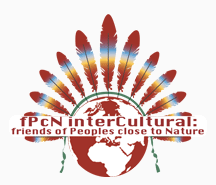 Survival International |
自然に近い人々の友(Rettet die Naturvölker.) サバイバル・インターナショナル(上掲) |
| References 1. "Cultural Survival". Charity Navigator. 2. "Remembering Pia: The Heart of Cultural Survival". Cultural Survival. September 8, 2015. Retrieved September 9, 2025. |
参考文献 1. 「カルチュラル・サバイバル」. チャリティ・ナビゲーター. 2. 「ピアを偲んで:カルチュラル・サバイバルの心臓部」. カルチュラル・サバイバル. 2015年9月8日. 2025年9月9日取得. |
| External links Official website "Program on Nonviolent Sanctions and Cultural Survival". SourceWatch. July 1, 2005. |
外部リンク 公式サイト 「非暴力制裁と文化的生存プログラム」。SourceWatch。2005年7月1日。 |
| https://en.wikipedia.org/wiki/Cultural_Survival |
links
リンク
文献
Do not copy and paste, but you might [re]think this message for all undergraduate students!!!
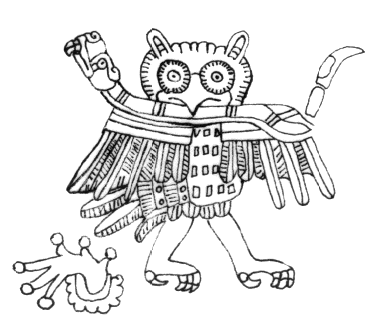
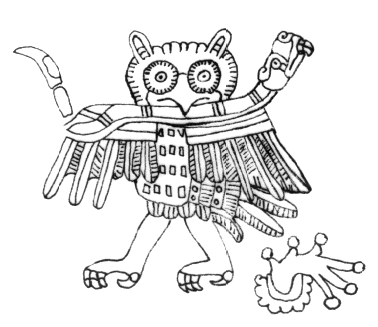
【資料編】
国際労働機関「1989 年の原住民及び種族民条約(第169号)」(The ILO Convention no. 169 )[仮訳]
Article 1
1. This Convention applies to:
(a) tribal peoples in
independent countries whose social, cultural and economic conditions
distinguish them from other sections of the national community, and
whose status is regulated wholly or partially by their own customs or
traditions or by special laws or regulations;
(b) peoples in independent
countries who are regarded as indigenous on account of their descent
from the populations which inhabited the country, or a geographical
region to which the country belongs, at the time of conquest or
colonisation or the establishment of present state boundaries and who,
irrespective of their legal status, retain some or all of their own
social, economic, cultural and political institutions.
2. Self-identification as indigenous or tribal shall
be regarded as a fundamental criterion for determining the groups to
which the provisions of this Convention apply.
3. The use of the term peoples in this Convention
shall not be construed as having any implications as regards the rights
which may attach to the term under international law.
1 この条約は、次の者について適用する。
(a) 独立国における種族民(tribal peoples )で、その社会的、文化的及び経済的状態によりその国の共同社会の他の部類の者と区別さ
れ、かつ、その地位が、自己の慣習若しくは伝統により又は特別の法令によって全部又は一部規制されているもの
(b) 独立国における人民で、征服、植民又は現在の国境の確
立の時に当該国又は当該国が地理的に属する地域に居住していた住民の子孫であるため原住民とみなされ、かつ、法律上の地位のいかんを問わず、自己の社会
的、経済的、文化的及び政治的制度の一部又は全部を保持しているもの
2 原住又は種族であるという自己認識(Self-identification
as indigenous or tribal)は、この条約を適用する集団を決定する基本的な基準とみなされる。
3 この条約における「人民」という語の使用は、国際法の下においてその語に付随する場合のある権利についていずれかの意味を有すると解釈してはならな
い。
Erica-Irene Daes 博士の定義:出典、WGIA, Who are the indigenous peoples?
The identification
outlined by the Chairperson of the United Nations' Working Group on
Indigenous Populations, Mme. Erica-Irene Daes designates certain
peoples as indigenous,
because they are descendants of groups which were in
the territory of the country at the time when other groups of different
cultures or ethnic origins arrived there;
because of their isolation from other segments of
the country's population they have preserved almost intact the customs
and traditions of their ancestors which are similar to those
characterised as indigenous; and
because they are, even if only formally, placed
under a State structure which incorporates national, social and
cultural characteristics alien to theirs.
++
Copyleft, CC, Mitzub'ixi Quq Chi'j, 1996-2099
Copyleft,
CC, Mitzub'ixi Quq Chi'j, 1996-2099